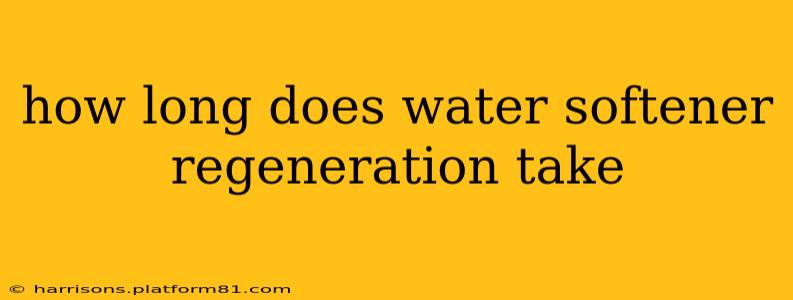Water softener regeneration is a crucial process that restores the resin beads' ability to remove hardness minerals from your water. The duration of this process varies significantly depending on several factors, but understanding these factors will help you better manage your system and ensure optimal performance. This comprehensive guide will delve into the specifics of regeneration time, common influencing factors, and troubleshooting tips.
What is Water Softener Regeneration?
Before we dive into timing, let's briefly clarify the regeneration process itself. Essentially, it's a "cleaning" cycle where the resin beads, saturated with calcium and magnesium ions, are flushed and replenished. This involves a series of steps:
- Brine Backwash: A concentrated salt solution (brine) is drawn into the tank, flushing away the accumulated hardness minerals clinging to the resin beads.
- Brine Rinse: The brine solution is then rinsed from the tank, ensuring all traces of minerals are removed.
- Fast Rinse: A quick water rinse further cleanses the resin, preparing it for the next softening cycle.
- Slow Rinse: A slower rinse ensures thorough cleaning and efficient preparation for the next cycle.
How Long Does the Regeneration Cycle Typically Take?
The regeneration cycle typically lasts between 2 and 4 hours, though it can sometimes take longer or shorter depending on various factors. This time encompasses all the stages mentioned above. You'll usually find the regeneration cycle automatically starts during off-peak hours, minimizing disruption to your water usage.
Factors Affecting Water Softener Regeneration Time
Several factors influence how long your water softener takes to regenerate:
1. Water Softener Size and Type:
Larger water softeners with a greater resin bed capacity naturally require longer regeneration times. Similarly, different softener types (e.g., demand-initiated vs. timer-initiated) will have varying cycle durations. Demand-initiated systems regenerate only when necessary, making their cycle length variable.
2. Brine Tank Size and Salt Level:
An insufficient salt level in the brine tank can prolong regeneration. The system needs enough salt to effectively cleanse the resin beads. Low salt levels force the system to work harder, increasing the time required.
3. Water Hardness:
Areas with exceptionally hard water might necessitate longer regeneration cycles to properly remove all the accumulated minerals. The higher the mineral content, the longer the system needs to work.
4. Regeneration Settings:
Manufacturers often provide options to adjust regeneration settings. You can adjust the water flow rate, brine draw time, and rinse cycles. Modifying these settings can affect the overall regeneration time. Refer to your owner's manual for specific instructions.
How to Determine Your Water Softener's Regeneration Time
The most reliable way to determine the regeneration time for your specific water softener is to consult your owner's manual. This manual will provide details on the typical cycle duration and any potential variations.
Troubleshooting Long Regeneration Cycles
If your water softener's regeneration cycle seems excessively long, consider these possibilities:
- Low Salt Level: Check the brine tank's salt level and replenish as needed. Low salt will significantly increase regeneration time.
- Clogged Brine Valve: A malfunctioning brine valve can impede the flow of brine, lengthening the regeneration cycle. Professional servicing might be necessary.
- Faulty Components: Other internal components could be failing, requiring professional repair or replacement.
Frequently Asked Questions
How often does a water softener regenerate?
The frequency of regeneration varies greatly, typically ranging from once every 2 to 7 days, depending on factors such as family size, water usage, and hardness levels. Some advanced systems regenerate only when necessary.
Can I speed up the regeneration process?
While you can't significantly speed up the process without compromising efficiency, ensuring sufficient salt and proper maintenance will prevent unnecessary delays.
What happens if my water softener doesn't regenerate properly?
Improper regeneration leads to reduced water softening capacity, potentially resulting in hard water throughout your home, damaging plumbing and appliances.
By understanding the factors influencing regeneration time and following proper maintenance procedures, you can ensure your water softener performs efficiently and provides consistently soft water to your home. Remember, consulting your owner's manual is key to addressing any specific concerns related to your model.
